
by Erin M. Threlfall | Feb 10, 2015 | 2015, Brazil, Education, Social Good, United Nations, World Moms Blog, World Voice
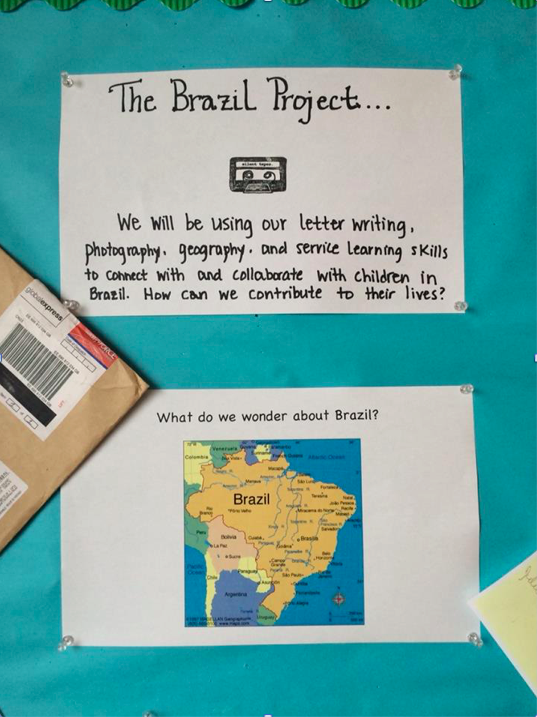 In January of 2014, I was asked to write about MDG 6 for the Gates Foundation Blog. It was part of an initiative that WMB was taking part in to help raise awareness about the UN Millennium Development Goals (MDGs). At the same time, I was just kicking off a unit in my grade 3 class room about Social Activism.
In January of 2014, I was asked to write about MDG 6 for the Gates Foundation Blog. It was part of an initiative that WMB was taking part in to help raise awareness about the UN Millennium Development Goals (MDGs). At the same time, I was just kicking off a unit in my grade 3 class room about Social Activism.
Our unit’s central idea was: International organizations and individuals can work together to have an impact on local and global issues. During this unit of study, the children would be working to answer the following questions: What are local and global issues? How do individuals and organizations address local and global issues? What are our responsibilities as global citizens? How can we use our interest, skills and talents to have an impact on local and global issues?
It turned out, the Gates Foundation piece was perfectly timed. I shared it with the children as an example of how I was using my skills and talents as a writer to raise awareness and they became inspired to want to use their talents to help make the MDGs a reality.
The children set off researching the MDGs, identifying the major issues, who was helping, and then started to ask if they could do something to help resolve some of the issues. They were especially tuned into development goal #1: Eradicate extreme poverty and hunger and #2: Achieve universal primary education.
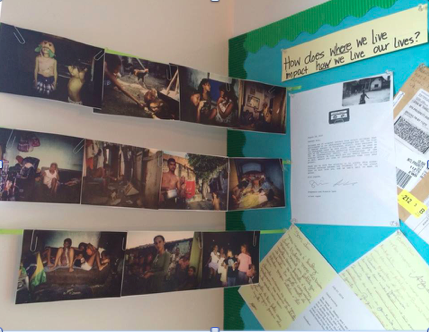
We had guest speakers from the United Nations and non-government organizations come in to talk with the children about the work that they do, we had Skype calls with people on the field, and then, as luck would have it, we had the opportunity to interview a young man from Brazil who started a newspaper in his favela when he was ten years old. The Paper’s goal was to raise awareness about issues impacting his community and to help bring about change.
Ten years later, that paper has become one of the most influential tools in impacting change on his favela, and has inspired other communities to follow suit.
My students were blown away by the fact that one ten-year old could have such an important impact on his community. They were motivated to help impact change, but how?
Sometimes, ours is not to know how, but just to have a desire and to ask the right questions. The “how” will find you, and in this case, it definitely did.
Through a series of serendipitous exchanges, at this time I was turned on to the work of two very inspiring people, Francis and Stephanie Lane and their Silent Tapes 50 Kids/50 Cameras project in Brazil. Stephanie and Francis were making their way to a favela in Fortaleza, Brazil during the World Cup to help children capture their world. They gave 50 cameras to 50 kids, and after they were taught photography skills, the kids were set free to capture their world. The project is part of a documentary initiative to bring awareness to the issues facing those living in the Favelas in Brazil. You can learn more about that here.
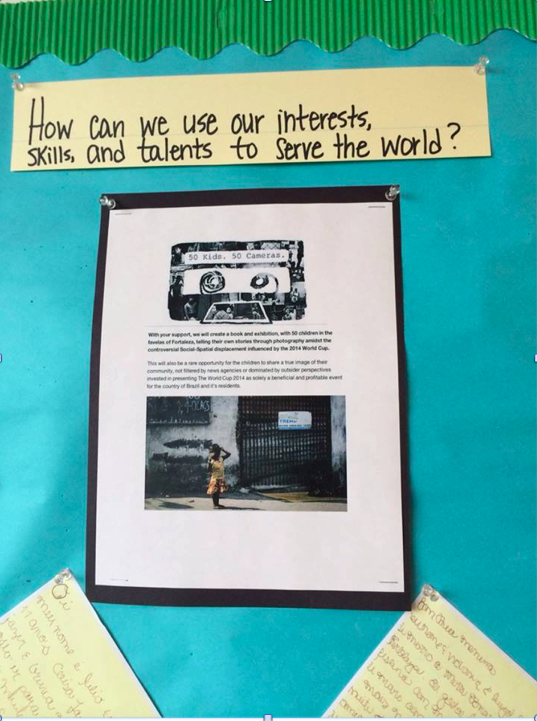
I told the children about the project, and they felt strongly that it should connect to the children at our school, the United Nations International School. It was their enthusiastic chorus of “PLEASE! Let us get to know the children!” That set the next chain of events into motion.
What has followed is an interdisciplinary cross-cultural project that connected the children in Brazil to the children in my classroom.
In collaboration with Stephanie and Francis, we arranged a pen-pal exchange between the Brazil cohort and mine. My students engaged in the same photography curriculum and captured their world in New York. During the project, we extended our look at the Millennium Development Goals, learned how to write letters, and deepened our geography skills. Perhaps the most important and lasting lesson is that of empathy.
Through the letter and photography exchange, my children became very aware of the impacts of poverty, and the reality of how this shapes another child’s reality. My students have developed a connection with children elsewhere, and really want to work to help improve their lives.
The project has taken on a life of its own. Now having gained sponsorship from UNICEF, we will be hosting a gala in April to showcase the work of the children in New York and Brazil, and to raise funds to help build a community center where the Brazilian children can gain access to education. Finally, the children’s work will be exhibited in the UNICEF wing at the UN headquarters in the spring.
This all came from that one World Moms Blog’s post assignment in which I was asked to write about the MDGs.
The opportunity to serve and make a difference: This is why I became a teacher. To help foster a generation of children who are empowered with the knowledge and skills they need to help make the world a better place. This is also why I started to write with World Mom’s Blog: to join a community of women who desire to help make the world a better place. When working together, we really can “Be the change we wish to see in the world.”
This is an original post written by Erin Threlfall for World Moms Blog.
Has there been a serendipitous chain of events that led to greater things in your life?

Originally from the US, Erin has credited her intense wanderlust and desire to live around the globe to her nomadic childhood. Every two to three years, her father’s work with a large international company provided the opportunity to know a different part of the US (VA, OH, PA, GA, SC, NY) and eventually Europe (Germany and Italy) and Asia (Thailand and Japan). Though her parents and siblings finally settled down in the heartland of America, Erin kept the suitcases in action and has called Ghana, South Korea, Togo, Bali, and now New York home. Single Mom to a fabulous seven-year-old citizen of the world, she is an educator and theatre artist who is fascinated with world cultures and artistic practices. Her big dream is to some day open a school focused on well-being and inquiry based learning to meet the needs of all her learners. In the meantime, Erin and her Little Man Edem, plan to keep investigating theatre and influencing education, one continent at a time. You can read some of her ramblings and perhaps find the common thread by checking our her personal blog, telling all about This Life http://www.erinmthrelfall.com/
More Posts - Website
Follow Me:


by Kyla P'an (Portugal) | Feb 8, 2015 | 2015, Education, International, Parenting, USA, World Voice
 I have long been an advocate of girls education. It is something I want every girl, wherever she is in the world, to have access to. I deeply believe educating girls is a major proponent in our quest to improve the world.
I have long been an advocate of girls education. It is something I want every girl, wherever she is in the world, to have access to. I deeply believe educating girls is a major proponent in our quest to improve the world.
So when my daughter was born eight years ago, I committed myself to ensuring that she would always have the access to and support she needs in attaining the best education my husband and I can give her.
But along with the paramount importance her education is to me, so too is her understanding of how valuable having an education is and how lucky she is to have safe schools and multiple options available to her.
But how do you impart this to an eight-year-old?
Like the majority of other eight-year-olds in the US, my daughter takes it for granted that she attends school five-days-a-week, Monday through Friday. But she also attends school on Sunday, when she goes to Chinese School. And this she does not take for granted, instead she long viewed it as a hindrance to her free-time. Because, though she only spends 90-minutes a week at Chinese school, its homework load and test schedule far exceed that of her American school, where she spends more than 30-hours-a-week.
Whenever my daughter complains about the work load or Chinese school conflicting with social events, I find myself saying:
You have NO idea how lucky you are to have more than one school to attend.
But until recently, this was a phrase delivered with little impact. That is, until my daughter started reading her latest book: I Am Malala, by Malala Yousafzai.
She received the book for Christmas, along with A Long Walk to Water, from her aunt. When she opened the gift, I was thrilled because, though I love Harry Potter and Percy Jackson, here were some stories that really mattered; finally, some glimpses into a REAL world, just one my child did not yet know.
I hoped, desperately, that she’d want to read these stories.
I was in luck.
Almost as soon as she picked up I Am Malala, she had trouble putting it down. It was filled with concepts she had trouble getting her head around: like the idea that a person could board Malala’s “school bus” with the intent to kill her or that having access to school was a privilege.
It had her asking all kinds of questions: about hardships and hurdles girls in other parts of the world have to face in order to get an education; about what it means to be a top student; about what sorts of sacrifices students (and their families) have to make in pursuit of education.
Reading Malala’s story is opening my daughter’s eyes to the opportunities and freedoms she takes for granted and it is giving her a deeper gratitude for what she has.
I don’t want my young children to worry about the injustices and evil out in the world but I do want them to understand better the many blessings they have and that not everyone has the same access to these opportunities.
Tomorrow, here in the US, our Public Broadcasting Service (PBS) will air the third and final episode of #APathAppears. In January, when World Moms Blog Founder, Jennifer Burden, World Voice Editor, Elizabeth Atalay and I attended the pre-screening of this series in New York, by invitation of @SaveTheChildren, it was episode 3 that resonated most with me.
The episode highlights Kibera, the largest slum in Kenya. But rather than showing us the desperate side of life in the slum, viewers (and readers of the eponymous book before) are introduced to Kennedy Odede and his wife Jessica and the organization they have built, Shining Hope for Communities(SHOFCO).
Like me, and so many others, SHOFCO knows that the pathway to hope is guided by educating girls. Authors Nicholas Kristoff and Sheryl WuDunn remind us that, if enough people walk in the direction of hope, ultimately A Path Appears.
You can watch the PBS series, A Path Appears online, by clicking here. Or read the book of the same title by husband and wife journalists @NickKristoff and Sheryl @WuDunn.
This is an original post to World Moms Blog by Sr. Editor and mother of two in Massachusetts, USA, Kyla P’an.
The image used in this post is credited to the author.
Kyla was born in suburban Philadelphia but spent most of her time growing up in New England. She took her first big, solo-trip at age 14, when she traveled to visit a friend on a small Greek island. Since then, travels have included: three months on the European rails, three years studying and working in Japan, and nine months taking the slow route back from Japan to the US when she was done. In addition to her work as Managing Editor of World Moms Network, Kyla is a freelance writer, copy editor, recovering triathlete and occasional blogger. Until recently, she and her husband resided outside of Boston, Massachusetts, where they were raising two spunky kids, two frisky cats, a snail, a fish and a snake. They now live outside of Lisbon, Portugal with two spunky teens and three frisky cats. You can read more about Kyla’s outlook on the world and parenting on her personal blogs, Growing Muses And Muses Where We Go
More Posts - Website
Follow Me:


by Jacqueline Jenkins (Jordan) | Feb 4, 2015 | Caring, Education, Gender, Helping, Human Rights, Humanity, Jordan, Multicultural, Refugees, refugees, Relocating, School, Social Good, Uncategorized, United Nations, World Motherhood
GRIT.
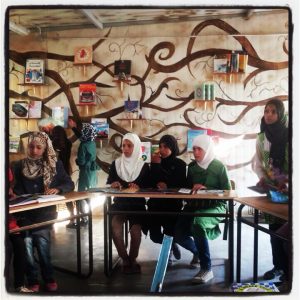
The girl children in the library reading the books which Jackie Jenkins bought.
We talk about it a lot as educators and parents. A few weeks ago I saw what it really means: to dig deep and push on with a smile on your face and a belief in a better tomorrow, even when faced with war on your doorstep and trauma in your past.
I had been waiting to go to the Zataari refugee camp with Rob (my husband and Representative for UNICEF Jordan) since we arrived in Jordan. The day finally arrived.
We viewed the water sanitation facilities and delivery trucks, which was fascinating. As an educator, however, I was most excited to see some of the schools. I was in my element the minute we walked through the gates. While Rob went to check on the status of classroom desks, play space construction, and water in the latrines, I wanted to see some kids.
I met two incredible principals of the girls’ section of school (girls attend school in the morning, boys in the afternoon). They told me that the Ministry of Education has done an excellent job at getting them all the teaching materials they need and that the school was in good condition. But class sizes are a problem. . . and so we began to walk. . . .
Grade 2 has more than 100 students in a classroom. Girls sit three to a bench, with the overflow sitting on the floor. When I walked in, they burst into a song, which I am sure I was meant to stand and smile at. But I can’t help myself around small people, so I just started dancing all over the place, up the aisles and in the front. The girls laughed and laughed. Kids are the same everywhere! But these children deserve a whole lot more after what they have been through.
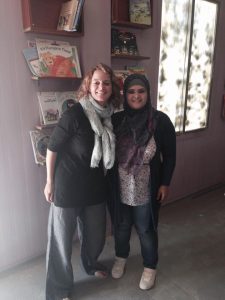
World Mom, Jackie Jenkins, with Iman Alkhaldi, the Librarian.
Luckily, there are people in their lives like Iman, whom I also met that day. She single-handedly built a library in one of the containers that serve as school rooms. She painted it, collected wood to build shelves, and is now looking for books. She spoke good enough English for me to understand her dreams and passion, and for me to tell her, “It is women like you who will change the world. You already are.” She cried, and I cried, and I also promised I would fill that room with books written in Arabic and English.
So I left with a new mission. If Iman can build a library oasis, if the dedicated teachers can manage to educate 100 students in a classroom without a complaint after walking out of their country affected by war, I could certainly help fill that library.
Within hours of being home, we set up a crowdrise page for donations. I sent out emails to international schools globally telling them the story of Iman and the children I had met. My 14 year old daughter talked it up on her social media networks, and I went to bed that night feeling a fire in my belly that I had not felt since my arrival. A deep passion to make a small difference in an immediate way. It seems the story resonated with many. In just 48 hours, I had reached my target goal, and was able to purchase more than 500 English and Arabic books, which were delivered to the library within the week.
Grit plus humanity–the connection and compassion with those around us–can accomplish astounding results. Yet again, I am filled with a sense of hope for the future of a region plagued by conflict and stress.
How do you help our children grow up with grit and the perseverance to face the challenges inevitable in their future? What is one concrete thing you might be able to do in your home or life that is a change for good?

We are a few months into our new 'home of our heart' location in Amman, Jordan. Originally from Canada, I have been moving around the globe for more than twenty years as my husband works for UNICEF. While we were a carefree couple in Uganda, Lesotho and Bangladesh, Meghan joined our family in 2000, while we were living in Myanmar. She was joined in 2005, while we were posted in India by Charlie, her energetic younger brother! Since then we have lived in Mozambique and New York. I am an educator and have been incredibly fortunate to have found rewarding jobs in international schools wherever we have been posted. Most recently I was the Elementary School Principal at the United Nations International School in Manhattan. Since arriving in Jordan, I have been a stay at home Mum, exploring, photographing and learning about the incredible history of the region and the issues facing not only the Jordan population but the incredible number of Syrian refugees currently residing in the country. While I speak English and French, I have not yet started to learn Arabic; a big goal for our time here.
I write to record and process this incredible journey we are on as a family. Time passes so incredibly quickly and without a recording of events, it's hard to remember the small moments and wonderings from each posting. Being a mother in this transient lifestyle means being the key cheerleader for our family, it means setting up and taking down a house with six weeks notice, it means creating close friendships and then saying goodbye. All this, while telling yourself that the opportunities your children have make the goodbyes and new hellos worthwhile. Raising a child in this lifestyle has incredible challenges and rewards. The challenges include culture shock every single time, even when you feel the move will be an easy one. It means coaching yourself, in your dark moments to be present and supportive to your children, who have not chosen to move but are trusting you to show them the world and the meaningfulness of the lifestyle we have committed to as a UNICEF family. The upsides to this lifestyle are incredible; the ability to have our children interact and learn about cultures, languages, food, and religions firsthand, the development of tolerance and empathy through relationships with many types of different people and the travel, they have been to more places before the age of ten than some people do in a lifetime! My commitment to raising children who believe in peace and feel responsible for making a difference in creating a better world is at the core of everything I do.
More Posts
Follow Me:


by Melanie Oda (Japan) | Jan 8, 2015 | 2014, Awareness, Child Care, Childhood, Culture, Domesticity, Education, Expat Life, Eye on Culture, Family, Feminism, Grandparent, Home, Husband, International, Japan, Life, Life Lesson, Living Abroad, Marriage, Me-Time, Motherhood, Multicultural, Parent Care, Parenting, Priorities, Relationships, Responsibility, School, Social Equality, Womanhood, Women's Rights, World Motherhood, Younger Children
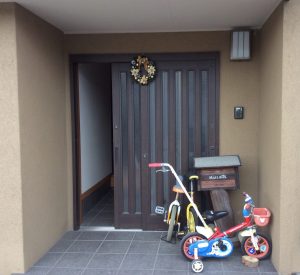 Gender equality has been in the news quite a bit in Japan recently, sort of, and some things have happened closer to home that have me thinking.
Gender equality has been in the news quite a bit in Japan recently, sort of, and some things have happened closer to home that have me thinking.
It started when a (female) Tokyo assembly member was heckled in a sexist way. Then Prime Minister Abe introduced some new policies to let women “shine.” (He needs to get them doing something for the economy.) He even appointed several women to cabinet posts, for about five minutes, until they were slapped back down into their places over minor scandals.
In Japan, people are talking more about issues women face but no one seems to be doing much about them.
(Lest I forget: strangely enough, the declining birth rate is treated as a “women’s issue.” I seem to remember my husband being involved, too.)
I never considered myself a feminist growing up. Some members of the evangelical, conservative community I grew up in doubtless felt “feminist” was a new version of the “F-word.”
OK, so I went to a high school with more sports options for boys than girls. And yes, girls were encouraged to take chorus and home economics instead of woodworking or mechanics. So maybe I heard men from my community refer to grown women as “broads” or “gals.” There also were some restrictions at church regarding women’s and men’s roles. But I never felt that possessing certain types of baby-making parts limited my potential.
Then I moved to Japan, where gender roles are more firmly entrenched and my way of thinking slowly changed.
As I get older, and because I am a mother, I find that I am limited in ways that I couldn’t have foreseen as a young girl.
Some people may find life here in Japan freeing. If you aspire to be a homemaker a la Martha Stewart, then your life’s work would be very much respected and appreciated here. My husband wouldn’t bat an eyelid if he came home to a messy house because I’d spent the day at a preschool mothers’ lunch. He knows that is part of the job (on the other hand, it would never occur to him to pick up the mess himself.)
If, as a woman, you have other aspirations, Japanese culture seems designed to work against you. The glass ceiling is very much in tact. On the news here you do hear issues like lack of childcare and “maternity harassment” being addressed. But what gets talked about less often is that to many women, including myself, it feels as if there’s a glass door as well.
It’s my front door.
Before a woman can even think about what is facing her out in the world, she needs to address the forces that are keeping her at home. Some of these are practical, some are logistical, some are cultural and perhaps peculiar to Japan and it’s work culture.
For me, it starts with my husband: He leaves home at 7am every morning, but I have no idea what time he will be back. Sometimes it’s 7pm. Sometimes it’s midnight. He may be in the office that day, or he may suddenly be sent to another prefecture. He’s made international trips on 12 hours notice. I cannot depend on him being home at a designated time, by no fault of his own. The idea of him taking time off with a sick child is preposterous in the extreme.
I have been lucky enough to have two job offers recently, both of which would be more or less during school hours, but neither is nearby. If a child were to get sick and need picking up, or if god-forbid there was a natural disaster (which is always in the back of your mind if you are a mother in Japan,) then my husband would be closer. I mentioned that, and he completely shot me down. Not just the idea of him picking up the kids in case of an emergency, but the idea of a job anywhere outside of cycling distance from the school.
We live in a residential neighborhood. I patch together some part-time work here and there, but it’s not like there are loads of professional opportunities in a two kilometer radius.
I suddenly felt very limited, penned in, in a way I haven’t felt before. The glass door was slamming in my face.
I don’t think I’m alone in this conundrum. Go to almost any supermarket in a residential area during the day, and you will see women in their prime working years manning the register. Many of these women have university degrees. Many have licenses and qualifications to be doing other kinds of work, but they want to stay close to home. They also need salaries to stay under $10,000 year or face a peculiar Japanese tax code and insurance system that penalizes families where both partners have incomes over that amount.
Then there are my kids: Like 2/3 of Japanese women with children under 6, I stayed home when they were small. They now completely depend on me for everything. It seems to have never entered their minds that someone else could give them a bath or help them find their missing socks, mostly because no one else has ever done anything for them. Especially when they are sick, they want only me. It was very hard when my daughter was in the hospital, both children wanting to be with me and emphatic that no one else would do.
But now my youngest is in elementary school, and I would like to just be doing more of something….else, but for me to plunge into the workforce would be a huge adjustment for my children. Is it worth the stress? Can we survive what is sure to be a painful adjustment period?
Maybe if I had more family support, it would feel less impossible but as it is, it seems like everyone is against me.
Which brings me to the final characters in this comedy, my in-laws: They say they’ll watch the kids, then they change their minds. Or something better comes up. From their point of view, this house and these people are completely my responsibility. Anything they do is extra credit.
To be honest, we’re getting to the point where my in-laws need my help more than I need theirs.
They aren’t shy about letting me know my place.
One day not too long ago, my son was playing at the park with his friends. It was getting close to homework time, so I called him and told him to come home. He said he was playing with Jiji (which is an endearing term for grandfather used in our region of Japan,) and could he play for a bit longer? Since he was out with an adult, I said okay.
The next day, I got a verbal whipping from my father-in-law over the phone, accusing me of being irresponsible, a bad mother. It took me a few minutes to understand why he was saying this, but when I got to the bottom of it, I realized my son had lied to me. He was playing with his friends when Jiji walked by and told him to go home. My son told him I wasn’t at home and said he couldn’t come back until I did. (I must have called right at this point.) “How dare you not be home in the afternoon?” said Jiji.
Putting aside that none of this nonsense was true, so what if I wasn’t home in the afternoon? Of course I wouldn’t have left the kids to wander the neighborhood like stray dogs, but why was my not physically being inside my house such an issue to him? His assumption that it was my duty to be always available to everyone took me by surprise.
I could almost hear the glass door slamming again.
There are also other barriers for women in Japan—an over active PTA for one, and a myriad of community responsibilities attended to exclusively by women for another. I imagine most women in the world encounter both the “glass door” and the “glass ceiling” in some form or another, but in Japan only one of these factors is seems to be getting much attention. Building new daycare facilities isn’t enough; the government stating goals to increase women’s participation in the workforce isn’t enough. Until we do something about that glass door, nothing will change for one of the best educated, least utilized group of women in the world.
Do you feel you are fulfilling your potential, both at work and at home? What’s the situation like in your country?
This is an original post for World Moms Blog from our writer and mother of two in Japan, Melanie Oda.
If you ask Melanie Oda where she is from, she will answer "Georgia." (Unless you ask her in Japanese. Then she will say "America.") It sounds nice, and it's a one-word answer, which is what most people expect. The truth is more complex. She moved around several small towns in the south growing up. Such is life when your father is a Southern Baptist preacher of the hellfire and brimstone variety.
She came to Japan in 2000 as an assistant language teacher, and has never managed to leave. She currently resides in Yokohama, on the outskirts of Tokyo (but please don't tell anyone she described it that way! Citizens of Yokohama have a lot of pride). No one is more surprised to find her here, married to a Japanese man and with two bilingual children (aged four and seven), than herself. And possibly her mother.
You can read more about her misadventures in Asia on her blog, HamakkoMommy.
More Posts
by Nihad | Jan 7, 2015 | 2014, Awareness, Education, Egypt, Family, Life, Relationships, Womanhood, Women's Rights, World Moms Blog, World Motherhood
 Happy New Year! In this season of resolutions, many of us are looking for ways to live a happier life. As a mother, I believe increasing one’s happiness is a wonderful thing to do for oneself and for one’s family–an angry, bitter and unhappy woman can never make her family happy. But how do we find our way to a happier life?
Happy New Year! In this season of resolutions, many of us are looking for ways to live a happier life. As a mother, I believe increasing one’s happiness is a wonderful thing to do for oneself and for one’s family–an angry, bitter and unhappy woman can never make her family happy. But how do we find our way to a happier life?
Happiness is all about us, about our mindset, what we believe and how we feel. Our circumstances, our possessions, our job and our bank account are just temporary sources of happiness. Real happiness shines from the inside out, reflecting how we feel about ourselves and how satisfied we are with who we are and how we live. As a life coach, here are 10 practices I’ve found that enhance my daily happiness.
1- Improve your self image: For me, the first and most important source of happiness is how I feel about the image I see in the mirror. How proud do I feel about myself? What kind of relationship do I have with myself? Do I offer myself love, respect, acceptance and appreciation? Or is it guilt, shame, anger, and low self esteem? Being happy with who I am is my main source of happiness.
2- Don’t seek approval of others: Many women live in a way they don’t want just to please their partner, their family, or their friends. Though this may result in short-term approval and acceptance, living according to others’ expectations will not create lasting happiness.
3- Keep your word to yourself: Learn to say NO to what is not a priority in your life. If you set a ME time for yourself ,do not give it up easily. Keeping your word to yourself will greatly enhance your feeling of self worth and self respect.
4- Eat healthy food and exercise: Healthy food will positively impact your mood and give you more energy. Working out regularly has a great effect on physical and mental health. According to a psychiatrist friend of mine, walking one hour in open air equates the effect of an antidepressant pill. So when you feel down, try going for a walk outside.
5- Let go: Let’s face it. There are some aspects of our lives we cannot control. We certainly can’t control, or change, the past. Accepting the reality that we can do nothing brings a great relief and freedom.
6- Find your passion: Working on something you love brings real satisfaction. If you haven’t yet found your passion, play around with different hobbies like making or listening to music, drawing, or writing. Expressing your thoughts and feelings in any way will help you get clear about what your passion is.
7- Keep only fulfilling relationships: Continuing with unhealthy and non-fulfilling relationships is an energy drain. See no. 3.
8- Keep a gratitude journal: Make it a habit to jot down 5 things in your life for which you are grateful. If have something you complain about all the time, follow your complaint with any positive you can find in it. Eventually, you may find a blessing in what you were complaining about.
9- LOL: Find a reason every day to laugh, and spend time with your beloved ones having fun and laughing out loud.
10- Spend some time away from media and technology: Take a brief holiday from the TV, radio, internet, even your iPhone. Spend the time working out, meeting friends, reading books, playing with your kids and pets, or taking a walk. Observe how you feel. Just few days (or even an afternoon) without media and technology will make great difference in your life and your satisfaction.
These are my tips on how to live a happier life. What are some things you do to add happiness to your life? What is your definition of happiness and do you find it easy to live according to this definition? What challenges do you face to live a happier life?
This is an original post for World Moms Blog by Nihad from Alexandria, Egypt. Nihad blogs at Aurora Beams Life Coaching.
Image courtesy of “Pretty Girl In A Hat At Sunset” by Stuart Miles, FreeDigitalPhotos.net

Nihad is an Egyptian woman, who was born and has lived her whole life in Alexandria, Egypt. She says, “People who visited this city know how charming and beautiful this city is. Although I love every city in Egypt, Alexandria is the one I love the most.”
She is a software engineer and has worked in the field for more than twenty years. But recently she quit her job, got a coaching certificate and she is now a self employed life and career coach. She says, “I believe that women in this era face big challenges and they are taking huge responsibilities. That's why I have chosen my niche -- women looking for happiness and satisfaction. I help and support them in making whatever change (career change, life change, behavior change, belief change…) they want to bring more satisfaction and happiness in their lives.”
Nihad is a mother of two lovely boys, 15 and 9 years old. She states, “They are the most precious gifts I have ever had. I madly love them, and I consider them the main source of happiness in my life.”
Our inspiring mother in Egypt can also be found at Aurora Beams Life Coaching.
More Posts

by Kyla P'an (Portugal) | Dec 11, 2014 | 2014, Adolescence, Awareness, Being Thankful, Bilingual, Cultural Differences, Culture, Education, Eye on Culture, Friendship, Inspirational, International, Japan, Language, Life, Life Lesson, Living Abroad, Multicultural, Parenting, Relationships, Responsibility, Study Abroad, Traditions, Travel, USA, World Motherhood
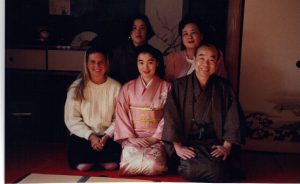
The author with her Japanese host family,
Oshogatsu (New Year’s Day), 1994
When I was eight years old, my mom moved from our home, outside of Philadelphia, Pennsylvania, to start a new life for herself in Los Angeles, California.
Growing up on the East Coast of the US, in the 1970’s, I had been exposed to only small pockets of Asian, immigrant populations; I knew nothing of the large, well-established Asian populations out on the West Coast.
On one of my first trips out to visit, my mom took me to an area of Los Angeles called Little Tokyo. As its name infers, it was a predominantly Japanese neighborhood and wandering around its streets made me feel like I had been transported to a different land.
I can’t remember if I had ever had sushi before my visit but certainly I had never experienced sushi in as authentic a setting as the restaurant she took me to that day.
The entrance involved crossing a wooden bridge over a small koi pond. There were stone lanterns and bonsai trees. the waitresses were all clad in kimono and the sushi arrived at our table on small wooden planks. I was mesmerized. For me, it was love at first…bite.
This experience had such an impact on me that, from that day on, I was enthralled by anything Japanese. I wanted to know everything I could about the country, culture and its people.
The Japanese were the great inventors of all things prominent in my childish memory: Iron Man, Godzilla, Kero-Kero Keroppi, Hello Kitty, my first Walkman. What a genius tribe they must be!
The rise of my curiosity coincided perfectly with the rise of the Japanese economy. Access to their food, products and even language grew increasingly accessible.
When I was in high school, a small group of students expressed their desire to study Japanese, a language option not yet offered at my school. Fortunately for us, since our school was less than an hour from Yale University—one of the US’s leading colleges—we petitioned for and received permission to get transportation to Yale one evening a week, so we could take an introductory-level Japanese language class there.
When I began researching colleges the following year, I selected only those with an established Japanese language program and study abroad opportunities.
I ended up at a small, liberal arts college in Tennessee with a strong International Studies department. I enrolled in every Japanese class they offered. In my sophomore year, I applied for and was accepted into my school’s Japanese exchange program with our sister university in Osaka, Japan.
At the end of my sophomore year, when all students had to declare their majors, I–along with one other student–petitioned for and was granted permission to develop the school’s first degree track in Japanese Studies. It seemed an auspicious plan, considering the Japanese purchase of the iconic, US landmark, Rockefeller Center, earlier that same year.
I spent my entire junior year of college abroad, studying at a Japanese university, living with two separate Japanese families and absorbing as much of the country and culture as possible for a college-aged kid.
I turned 21 there, a major American coming-of-age. I participated on Japanese sports teams, took painting and pottery classes, studied the culture through the fascinating lens of manga (Japanese comics), dated only Japanese men and immersed myself in the pursuit of understanding all things Japanese.
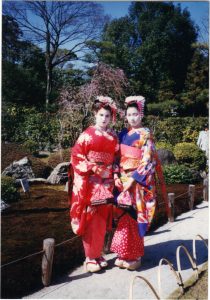
The author and her host sister dressed in kimono
My study abroad experience had an unbelievable impact on my life. It launched my passion and insatiable hunger for travel and Asia, beyond Japan.
I gained greater independence, broadened my global perspectives, forged life-long friendships, developed cultural empathy and experienced life as a minority; a gaijin (outsider) in a homogeneous land.
I consider my study abroad experience the foundation of the life I built upon it. I know that many of us here at World Moms Blog also have had experiences living and studying abroad; it is one of the many ties that bind us. We are global citizens striving to raise our own children in an increasingly globalized world.
But, as you will learn later today from World Moms Blog Founder, Jennifer Burden, here in the US, accessibility to and enthusiasm for studying abroad are not as prevalent as many of us may think.
So what’s it like in your country? Are study abroad programs prolific on your college campuses? Did you benefit from studying abroad? Tell us about what the experience means to you.
And stay tuned later today for Jen’s post on Studying Abroad and how the White House is playing a part…
This is an original post to World Moms Blog from our managing editor and mother of two rising, global citizens, Kyla P’an.
The pictures used in this post are credited to the author.
Kyla was born in suburban Philadelphia but spent most of her time growing up in New England. She took her first big, solo-trip at age 14, when she traveled to visit a friend on a small Greek island. Since then, travels have included: three months on the European rails, three years studying and working in Japan, and nine months taking the slow route back from Japan to the US when she was done. In addition to her work as Managing Editor of World Moms Network, Kyla is a freelance writer, copy editor, recovering triathlete and occasional blogger. Until recently, she and her husband resided outside of Boston, Massachusetts, where they were raising two spunky kids, two frisky cats, a snail, a fish and a snake. They now live outside of Lisbon, Portugal with two spunky teens and three frisky cats. You can read more about Kyla’s outlook on the world and parenting on her personal blogs, Growing Muses And Muses Where We Go
More Posts - Website
Follow Me:


 In January of 2014, I was asked to write about MDG 6 for the Gates Foundation Blog. It was part of an initiative that WMB was taking part in to help raise awareness about the UN Millennium Development Goals (MDGs). At the same time, I was just kicking off a unit in my grade 3 class room about Social Activism.
In January of 2014, I was asked to write about MDG 6 for the Gates Foundation Blog. It was part of an initiative that WMB was taking part in to help raise awareness about the UN Millennium Development Goals (MDGs). At the same time, I was just kicking off a unit in my grade 3 class room about Social Activism.


















